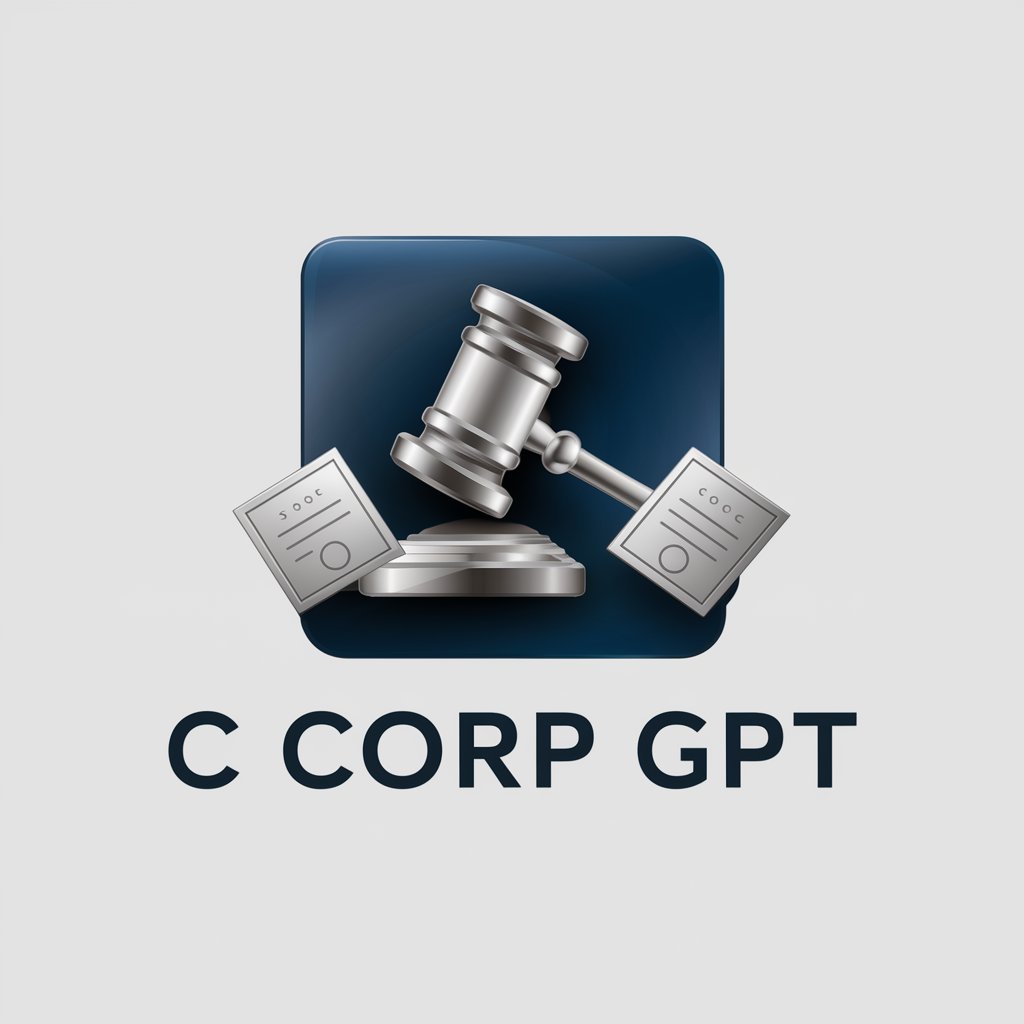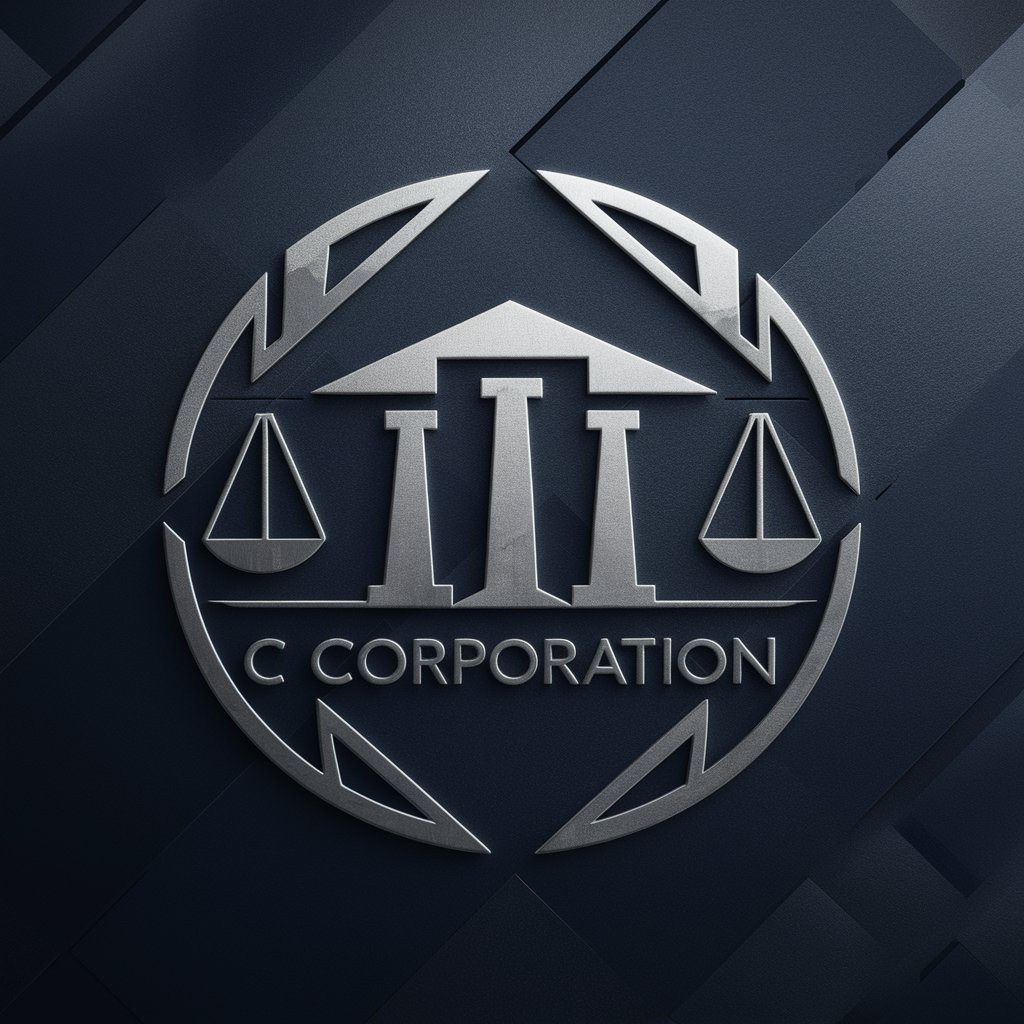C Corp - C Corp Insights and Guidance

Welcome! I'm here to provide expert information about C Corporations.
Empowering Businesses with AI-Driven C Corp Knowledge
What are the key benefits of forming a C Corporation?
How does the legal structure of a C Corp differ from other business entities?
What are the tax implications for owners of a C Corporation?
Can you explain the process of issuing stock options in a C Corporation?
Get Embed Code
Understanding C Corporations
A C Corporation (C Corp) is a legal structure for a corporation in which the owners, or shareholders, are taxed separately from the entity. C Corps are the most common type of corporation in the U.S. and are subject to corporate income tax. This structure allows a C Corp to have an unlimited number of shareholders, issue multiple classes of stock, and raise investment more easily than other business forms. C Corps provide limited liability protection, meaning shareholders' personal assets are protected from the corporation's debts and obligations. An example scenario illustrating the purpose of a C Corp could involve TechStart Inc., a technology firm that chooses the C Corp status to attract multiple investors and raise funds for expansion without exposing shareholders to personal financial risk beyond their investment in the company. Powered by ChatGPT-4o。

Key Functions of C Corporations
Limited Liability Protection
Example
For instance, if TechStart Inc. faces a lawsuit or incurs debt, the personal assets of its shareholders, such as homes or savings, are not at risk.
Scenario
A shareholder in TechStart Inc. cannot be personally sued for actions or debts of the corporation.
Raising Capital
Example
TechStart Inc. can issue various classes of shares to attract different investors, leveraging its C Corp status to secure necessary funding for a new product launch.
Scenario
TechStart Inc. announces an initial public offering (IPO) to sell stock to the public, raising significant capital.
Perpetual Existence
Example
Even if an owner dies or sells their shares, TechStart Inc. continues to operate uninterrupted, ensuring business continuity.
Scenario
After the passing of a founding shareholder, TechStart Inc. remains unaffected, continuing its operations and growth strategies.
Tax Benefits and Deductions
Example
TechStart Inc. takes advantage of tax deductions unavailable to sole proprietorships, like health insurance premiums paid on behalf of employees.
Scenario
TechStart Inc. significantly reduces its taxable income through various corporate tax deductions, optimizing financial performance.
Ideal Users of C Corporation Structure
Startup Founders
Startup founders planning to raise capital through equity financing, seeking to attract venture capital or considering an IPO, benefit from the C Corp structure due to its attractiveness to investors and the ability to issue multiple classes of stock.
Established Businesses Looking to Expand
Businesses with plans for significant growth or expansion can leverage the C Corp structure to more easily raise capital through the sale of stock and to offer stock options or bonuses to employees, thus attracting and retaining talent.
Companies Planning for Longevity
Businesses aiming for a long-term presence benefit from the C Corp's perpetual existence feature, ensuring the company can outlive its founders and continue operations indefinitely, regardless of changes in ownership.

Guidelines for Utilizing C Corp
Initiate Your Experience
Begin by accessing yeschat.ai for a complimentary trial, requiring no sign-up or subscription to ChatGPT Plus, ensuring an easy start.
Understand the Basics
Familiarize yourself with the core functionalities of C Corp, including its legal structure, benefits, tax implications, and stock options, to leverage its features effectively.
Identify Your Needs
Evaluate your business requirements to determine how C Corp can best serve your objectives, whether for raising capital, tax planning, or expanding ownership.
Engage with Features
Utilize the platform's tools and resources to explore various aspects of C Corps, from legal documentation to financial management strategies.
Seek Professional Advice
Consider consulting with legal and financial advisors to tailor the C Corp structure to your specific business needs and maximize its benefits.
Try other advanced and practical GPTs
C Corporation
Empowering Business with AI-driven C Corp Insights

Läroplansgenerator
AI-Powered Syllabus Guidance

Technical
Empowering Innovation with AI Expertise

Technical Integration
Empowering seamless system connections with AI

Select Fire Rifles
Empowering knowledge on select-fire rifles with AI

Docker Helper
AI-powered Docker Command Guide

KallistiOS Dev Guru
Empowering Dreamcast development with AI.

Mom's Helper
Empowering Moms with AI-Powered Guidance

Screenplay Analyst
Elevate Your Script with AI-Powered Analysis

SEO SAM
AI-Powered SEO Content Enhancement

Resume Hero GPT
Craft Your Career Story with AI

Markdown copy/pasta article summary
Streamline News with AI-Powered Summaries

C Corp In-Depth Q&A
What defines a C Corporation?
A C Corporation is a legal structure for a business where the company is considered separate from its owners. This separation provides limited liability protection to the owners, allows for the issuance of stock to raise capital, and subjects the corporation to corporate income tax.
How does taxation work for C Corps?
C Corps are subject to double taxation where the corporation's profits are taxed at the corporate level, and dividends distributed to shareholders are taxed again at the individual level. However, they benefit from tax-deductible business expenses.
Can C Corps have shareholders outside the U.S.?
Yes, C Corps can have international shareholders. This flexibility makes them an attractive option for companies looking to raise capital globally.
What are the benefits of choosing a C Corp?
Benefits include limited liability protection, ability to raise capital through stock, perpetual existence, and potential tax advantages related to employee benefits and business expenses.
What is required to maintain a C Corp?
Maintaining a C Corp requires adherence to regulatory requirements such as filing annual reports, maintaining corporate records, holding regular board and shareholder meetings, and ensuring compliance with federal and state tax filings.
